Exploring Vitamin C for Cancer Prevention: A Literature Review
VerifiedAdded on 2022/08/26
|7
|1560
|21
Literature Review
AI Summary
This literature review critically evaluates the efficacy of Vitamin C in cancer prevention, drawing from recent research and meta-analyses. The review highlights contrasting results regarding Vitamin C's role, noting limitations in study designs such as sample selection and inconsistent outcomes. While some evidence suggests Vitamin C may offer supportive care benefits, no conclusive research proves its ability to control cancer or minimize patient risk. The review identifies gaps in past research, including a lack of decisive evidence on Vitamin C's mechanism of action and therapeutic efficacy, emphasizing the need for robust clinical trials, particularly in younger populations. The study concludes that current evidence does not support Vitamin C as a primary cancer treatment but suggests potential for supportive care interventions, underscoring the importance of rigorous research to clarify its role. Desklib provides access to similar literature reviews and study resources for students.
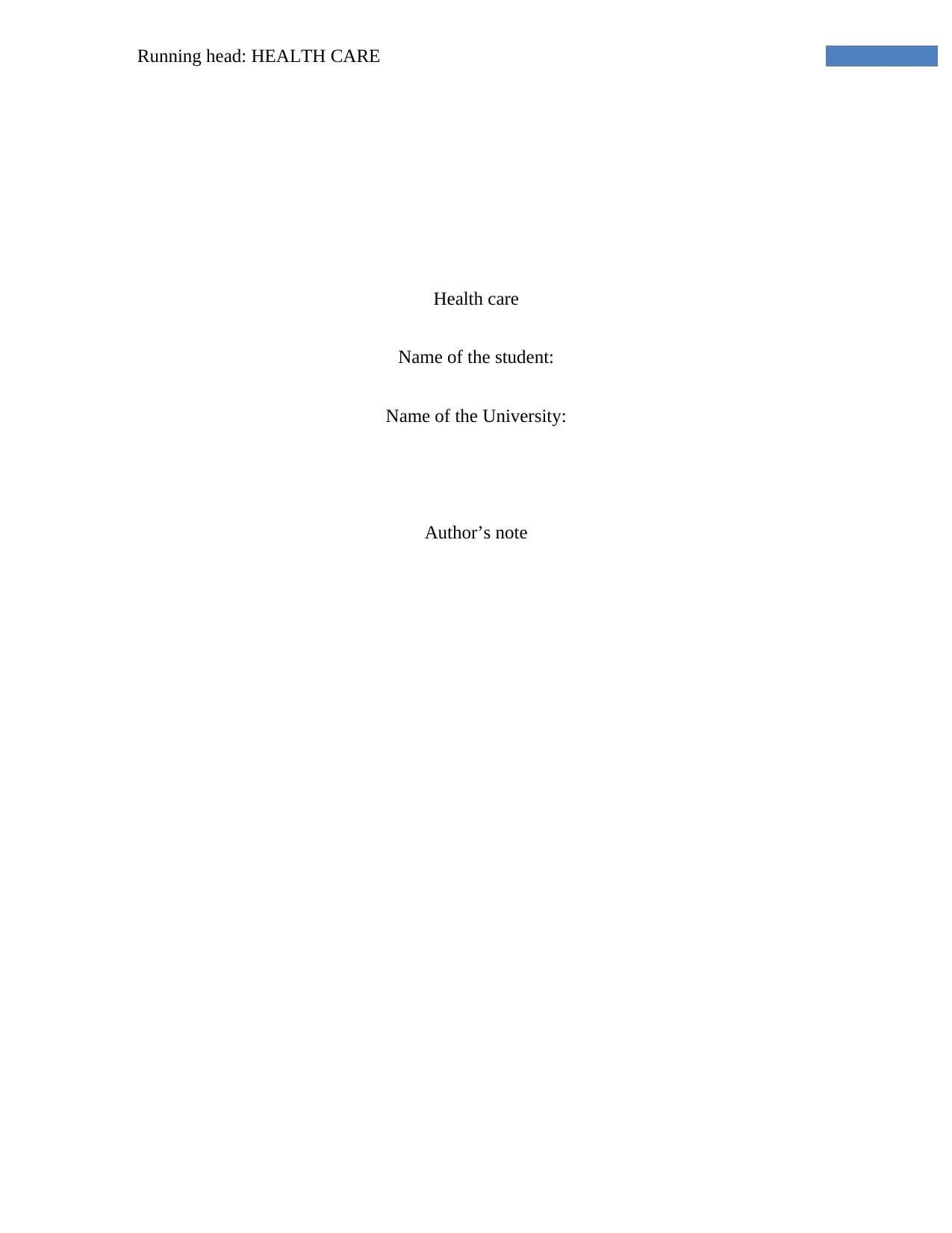
Running head: HEALTH CARE
Health care
Name of the student:
Name of the University:
Author’s note
Health care
Name of the student:
Name of the University:
Author’s note
Paraphrase This Document
Need a fresh take? Get an instant paraphrase of this document with our AI Paraphraser
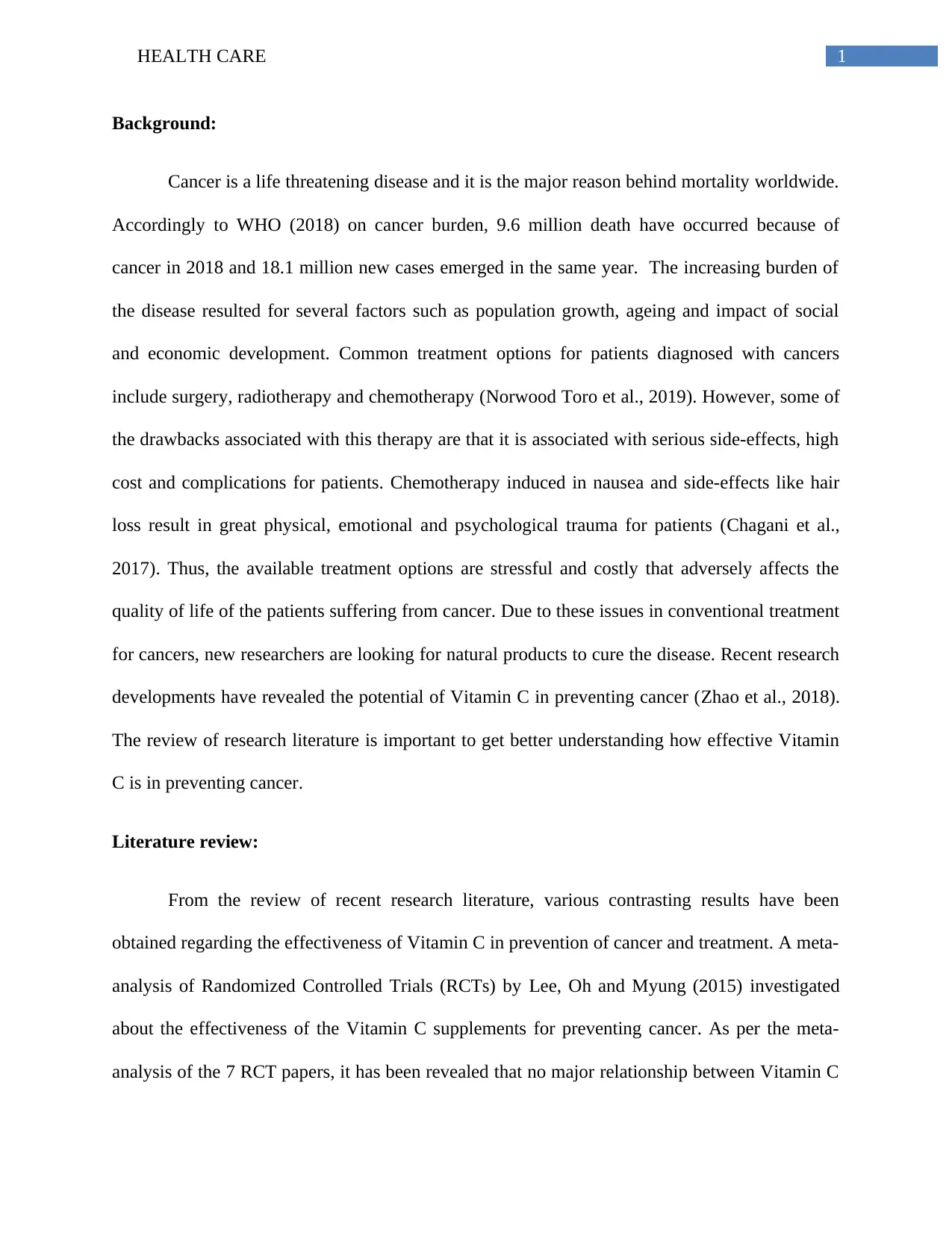
1HEALTH CARE
Background:
Cancer is a life threatening disease and it is the major reason behind mortality worldwide.
Accordingly to WHO (2018) on cancer burden, 9.6 million death have occurred because of
cancer in 2018 and 18.1 million new cases emerged in the same year. The increasing burden of
the disease resulted for several factors such as population growth, ageing and impact of social
and economic development. Common treatment options for patients diagnosed with cancers
include surgery, radiotherapy and chemotherapy (Norwood Toro et al., 2019). However, some of
the drawbacks associated with this therapy are that it is associated with serious side-effects, high
cost and complications for patients. Chemotherapy induced in nausea and side-effects like hair
loss result in great physical, emotional and psychological trauma for patients (Chagani et al.,
2017). Thus, the available treatment options are stressful and costly that adversely affects the
quality of life of the patients suffering from cancer. Due to these issues in conventional treatment
for cancers, new researchers are looking for natural products to cure the disease. Recent research
developments have revealed the potential of Vitamin C in preventing cancer (Zhao et al., 2018).
The review of research literature is important to get better understanding how effective Vitamin
C is in preventing cancer.
Literature review:
From the review of recent research literature, various contrasting results have been
obtained regarding the effectiveness of Vitamin C in prevention of cancer and treatment. A meta-
analysis of Randomized Controlled Trials (RCTs) by Lee, Oh and Myung (2015) investigated
about the effectiveness of the Vitamin C supplements for preventing cancer. As per the meta-
analysis of the 7 RCT papers, it has been revealed that no major relationship between Vitamin C
Background:
Cancer is a life threatening disease and it is the major reason behind mortality worldwide.
Accordingly to WHO (2018) on cancer burden, 9.6 million death have occurred because of
cancer in 2018 and 18.1 million new cases emerged in the same year. The increasing burden of
the disease resulted for several factors such as population growth, ageing and impact of social
and economic development. Common treatment options for patients diagnosed with cancers
include surgery, radiotherapy and chemotherapy (Norwood Toro et al., 2019). However, some of
the drawbacks associated with this therapy are that it is associated with serious side-effects, high
cost and complications for patients. Chemotherapy induced in nausea and side-effects like hair
loss result in great physical, emotional and psychological trauma for patients (Chagani et al.,
2017). Thus, the available treatment options are stressful and costly that adversely affects the
quality of life of the patients suffering from cancer. Due to these issues in conventional treatment
for cancers, new researchers are looking for natural products to cure the disease. Recent research
developments have revealed the potential of Vitamin C in preventing cancer (Zhao et al., 2018).
The review of research literature is important to get better understanding how effective Vitamin
C is in preventing cancer.
Literature review:
From the review of recent research literature, various contrasting results have been
obtained regarding the effectiveness of Vitamin C in prevention of cancer and treatment. A meta-
analysis of Randomized Controlled Trials (RCTs) by Lee, Oh and Myung (2015) investigated
about the effectiveness of the Vitamin C supplements for preventing cancer. As per the meta-
analysis of the 7 RCT papers, it has been revealed that no major relationship between Vitamin C
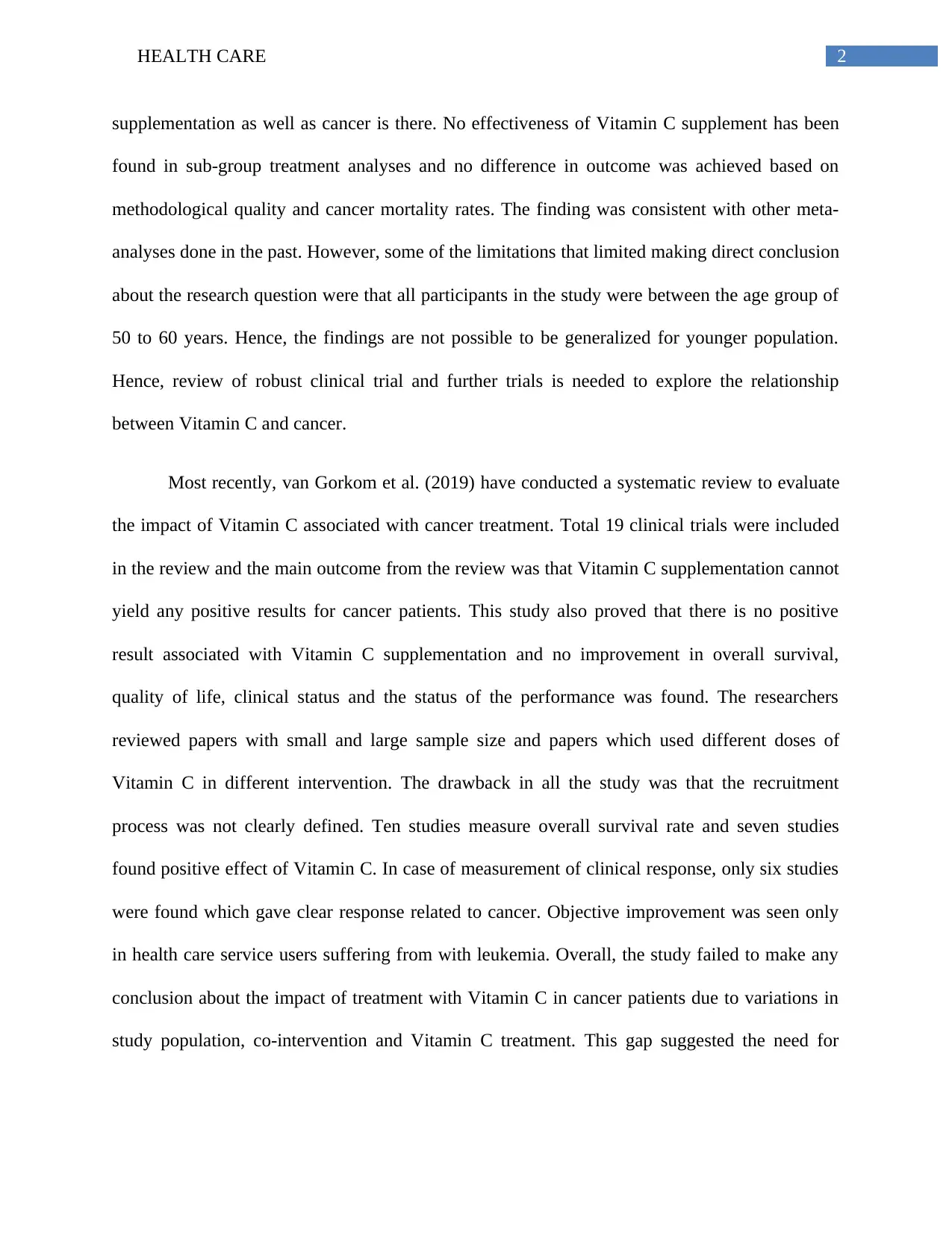
2HEALTH CARE
supplementation as well as cancer is there. No effectiveness of Vitamin C supplement has been
found in sub-group treatment analyses and no difference in outcome was achieved based on
methodological quality and cancer mortality rates. The finding was consistent with other meta-
analyses done in the past. However, some of the limitations that limited making direct conclusion
about the research question were that all participants in the study were between the age group of
50 to 60 years. Hence, the findings are not possible to be generalized for younger population.
Hence, review of robust clinical trial and further trials is needed to explore the relationship
between Vitamin C and cancer.
Most recently, van Gorkom et al. (2019) have conducted a systematic review to evaluate
the impact of Vitamin C associated with cancer treatment. Total 19 clinical trials were included
in the review and the main outcome from the review was that Vitamin C supplementation cannot
yield any positive results for cancer patients. This study also proved that there is no positive
result associated with Vitamin C supplementation and no improvement in overall survival,
quality of life, clinical status and the status of the performance was found. The researchers
reviewed papers with small and large sample size and papers which used different doses of
Vitamin C in different intervention. The drawback in all the study was that the recruitment
process was not clearly defined. Ten studies measure overall survival rate and seven studies
found positive effect of Vitamin C. In case of measurement of clinical response, only six studies
were found which gave clear response related to cancer. Objective improvement was seen only
in health care service users suffering from with leukemia. Overall, the study failed to make any
conclusion about the impact of treatment with Vitamin C in cancer patients due to variations in
study population, co-intervention and Vitamin C treatment. This gap suggested the need for
supplementation as well as cancer is there. No effectiveness of Vitamin C supplement has been
found in sub-group treatment analyses and no difference in outcome was achieved based on
methodological quality and cancer mortality rates. The finding was consistent with other meta-
analyses done in the past. However, some of the limitations that limited making direct conclusion
about the research question were that all participants in the study were between the age group of
50 to 60 years. Hence, the findings are not possible to be generalized for younger population.
Hence, review of robust clinical trial and further trials is needed to explore the relationship
between Vitamin C and cancer.
Most recently, van Gorkom et al. (2019) have conducted a systematic review to evaluate
the impact of Vitamin C associated with cancer treatment. Total 19 clinical trials were included
in the review and the main outcome from the review was that Vitamin C supplementation cannot
yield any positive results for cancer patients. This study also proved that there is no positive
result associated with Vitamin C supplementation and no improvement in overall survival,
quality of life, clinical status and the status of the performance was found. The researchers
reviewed papers with small and large sample size and papers which used different doses of
Vitamin C in different intervention. The drawback in all the study was that the recruitment
process was not clearly defined. Ten studies measure overall survival rate and seven studies
found positive effect of Vitamin C. In case of measurement of clinical response, only six studies
were found which gave clear response related to cancer. Objective improvement was seen only
in health care service users suffering from with leukemia. Overall, the study failed to make any
conclusion about the impact of treatment with Vitamin C in cancer patients due to variations in
study population, co-intervention and Vitamin C treatment. This gap suggested the need for
⊘ This is a preview!⊘
Do you want full access?
Subscribe today to unlock all pages.

Trusted by 1+ million students worldwide
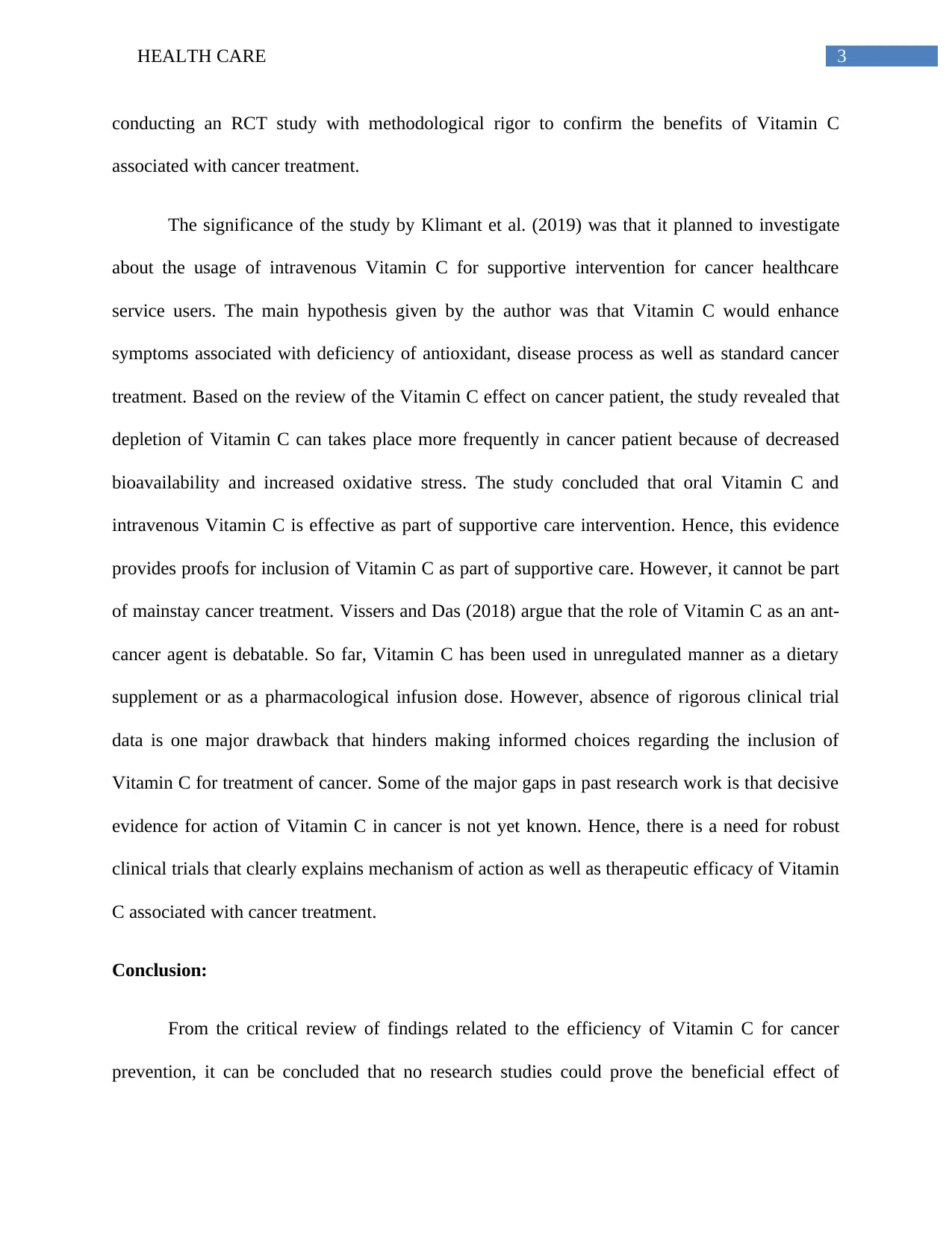
3HEALTH CARE
conducting an RCT study with methodological rigor to confirm the benefits of Vitamin C
associated with cancer treatment.
The significance of the study by Klimant et al. (2019) was that it planned to investigate
about the usage of intravenous Vitamin C for supportive intervention for cancer healthcare
service users. The main hypothesis given by the author was that Vitamin C would enhance
symptoms associated with deficiency of antioxidant, disease process as well as standard cancer
treatment. Based on the review of the Vitamin C effect on cancer patient, the study revealed that
depletion of Vitamin C can takes place more frequently in cancer patient because of decreased
bioavailability and increased oxidative stress. The study concluded that oral Vitamin C and
intravenous Vitamin C is effective as part of supportive care intervention. Hence, this evidence
provides proofs for inclusion of Vitamin C as part of supportive care. However, it cannot be part
of mainstay cancer treatment. Vissers and Das (2018) argue that the role of Vitamin C as an ant-
cancer agent is debatable. So far, Vitamin C has been used in unregulated manner as a dietary
supplement or as a pharmacological infusion dose. However, absence of rigorous clinical trial
data is one major drawback that hinders making informed choices regarding the inclusion of
Vitamin C for treatment of cancer. Some of the major gaps in past research work is that decisive
evidence for action of Vitamin C in cancer is not yet known. Hence, there is a need for robust
clinical trials that clearly explains mechanism of action as well as therapeutic efficacy of Vitamin
C associated with cancer treatment.
Conclusion:
From the critical review of findings related to the efficiency of Vitamin C for cancer
prevention, it can be concluded that no research studies could prove the beneficial effect of
conducting an RCT study with methodological rigor to confirm the benefits of Vitamin C
associated with cancer treatment.
The significance of the study by Klimant et al. (2019) was that it planned to investigate
about the usage of intravenous Vitamin C for supportive intervention for cancer healthcare
service users. The main hypothesis given by the author was that Vitamin C would enhance
symptoms associated with deficiency of antioxidant, disease process as well as standard cancer
treatment. Based on the review of the Vitamin C effect on cancer patient, the study revealed that
depletion of Vitamin C can takes place more frequently in cancer patient because of decreased
bioavailability and increased oxidative stress. The study concluded that oral Vitamin C and
intravenous Vitamin C is effective as part of supportive care intervention. Hence, this evidence
provides proofs for inclusion of Vitamin C as part of supportive care. However, it cannot be part
of mainstay cancer treatment. Vissers and Das (2018) argue that the role of Vitamin C as an ant-
cancer agent is debatable. So far, Vitamin C has been used in unregulated manner as a dietary
supplement or as a pharmacological infusion dose. However, absence of rigorous clinical trial
data is one major drawback that hinders making informed choices regarding the inclusion of
Vitamin C for treatment of cancer. Some of the major gaps in past research work is that decisive
evidence for action of Vitamin C in cancer is not yet known. Hence, there is a need for robust
clinical trials that clearly explains mechanism of action as well as therapeutic efficacy of Vitamin
C associated with cancer treatment.
Conclusion:
From the critical review of findings related to the efficiency of Vitamin C for cancer
prevention, it can be concluded that no research studies could prove the beneficial effect of
Paraphrase This Document
Need a fresh take? Get an instant paraphrase of this document with our AI Paraphraser
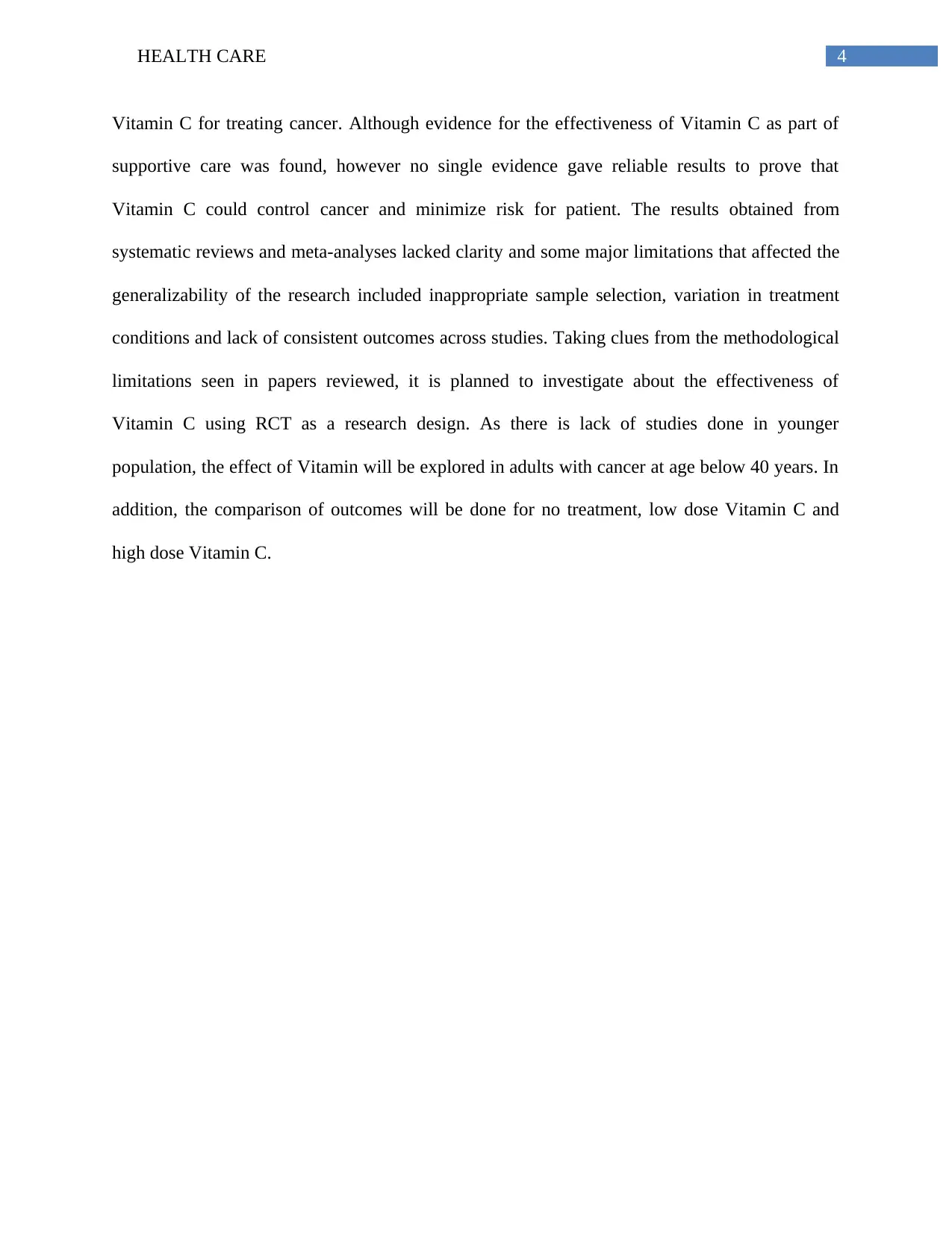
4HEALTH CARE
Vitamin C for treating cancer. Although evidence for the effectiveness of Vitamin C as part of
supportive care was found, however no single evidence gave reliable results to prove that
Vitamin C could control cancer and minimize risk for patient. The results obtained from
systematic reviews and meta-analyses lacked clarity and some major limitations that affected the
generalizability of the research included inappropriate sample selection, variation in treatment
conditions and lack of consistent outcomes across studies. Taking clues from the methodological
limitations seen in papers reviewed, it is planned to investigate about the effectiveness of
Vitamin C using RCT as a research design. As there is lack of studies done in younger
population, the effect of Vitamin will be explored in adults with cancer at age below 40 years. In
addition, the comparison of outcomes will be done for no treatment, low dose Vitamin C and
high dose Vitamin C.
Vitamin C for treating cancer. Although evidence for the effectiveness of Vitamin C as part of
supportive care was found, however no single evidence gave reliable results to prove that
Vitamin C could control cancer and minimize risk for patient. The results obtained from
systematic reviews and meta-analyses lacked clarity and some major limitations that affected the
generalizability of the research included inappropriate sample selection, variation in treatment
conditions and lack of consistent outcomes across studies. Taking clues from the methodological
limitations seen in papers reviewed, it is planned to investigate about the effectiveness of
Vitamin C using RCT as a research design. As there is lack of studies done in younger
population, the effect of Vitamin will be explored in adults with cancer at age below 40 years. In
addition, the comparison of outcomes will be done for no treatment, low dose Vitamin C and
high dose Vitamin C.
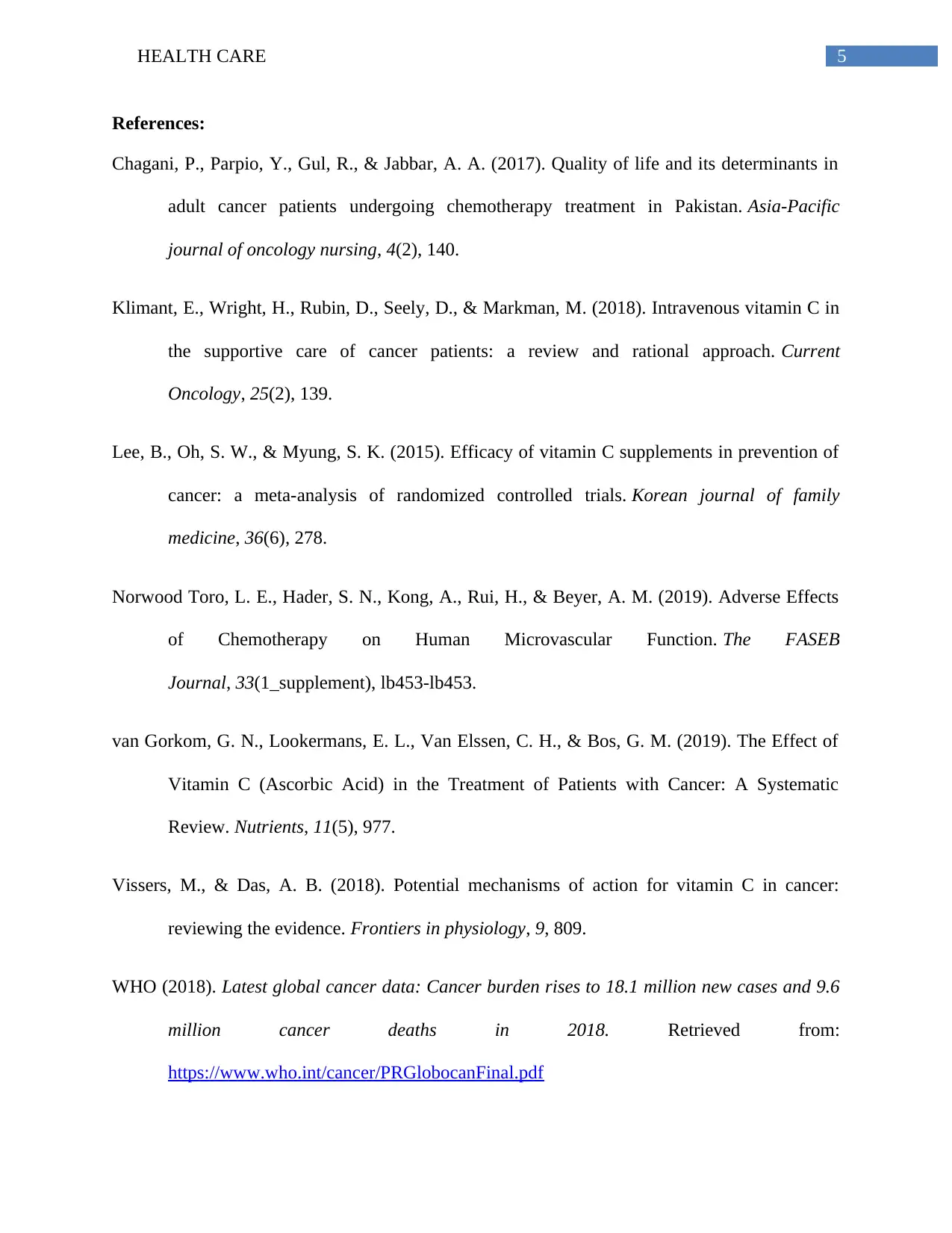
5HEALTH CARE
References:
Chagani, P., Parpio, Y., Gul, R., & Jabbar, A. A. (2017). Quality of life and its determinants in
adult cancer patients undergoing chemotherapy treatment in Pakistan. Asia-Pacific
journal of oncology nursing, 4(2), 140.
Klimant, E., Wright, H., Rubin, D., Seely, D., & Markman, M. (2018). Intravenous vitamin C in
the supportive care of cancer patients: a review and rational approach. Current
Oncology, 25(2), 139.
Lee, B., Oh, S. W., & Myung, S. K. (2015). Efficacy of vitamin C supplements in prevention of
cancer: a meta-analysis of randomized controlled trials. Korean journal of family
medicine, 36(6), 278.
Norwood Toro, L. E., Hader, S. N., Kong, A., Rui, H., & Beyer, A. M. (2019). Adverse Effects
of Chemotherapy on Human Microvascular Function. The FASEB
Journal, 33(1_supplement), lb453-lb453.
van Gorkom, G. N., Lookermans, E. L., Van Elssen, C. H., & Bos, G. M. (2019). The Effect of
Vitamin C (Ascorbic Acid) in the Treatment of Patients with Cancer: A Systematic
Review. Nutrients, 11(5), 977.
Vissers, M., & Das, A. B. (2018). Potential mechanisms of action for vitamin C in cancer:
reviewing the evidence. Frontiers in physiology, 9, 809.
WHO (2018). Latest global cancer data: Cancer burden rises to 18.1 million new cases and 9.6
million cancer deaths in 2018. Retrieved from:
https://www.who.int/cancer/PRGlobocanFinal.pdf
References:
Chagani, P., Parpio, Y., Gul, R., & Jabbar, A. A. (2017). Quality of life and its determinants in
adult cancer patients undergoing chemotherapy treatment in Pakistan. Asia-Pacific
journal of oncology nursing, 4(2), 140.
Klimant, E., Wright, H., Rubin, D., Seely, D., & Markman, M. (2018). Intravenous vitamin C in
the supportive care of cancer patients: a review and rational approach. Current
Oncology, 25(2), 139.
Lee, B., Oh, S. W., & Myung, S. K. (2015). Efficacy of vitamin C supplements in prevention of
cancer: a meta-analysis of randomized controlled trials. Korean journal of family
medicine, 36(6), 278.
Norwood Toro, L. E., Hader, S. N., Kong, A., Rui, H., & Beyer, A. M. (2019). Adverse Effects
of Chemotherapy on Human Microvascular Function. The FASEB
Journal, 33(1_supplement), lb453-lb453.
van Gorkom, G. N., Lookermans, E. L., Van Elssen, C. H., & Bos, G. M. (2019). The Effect of
Vitamin C (Ascorbic Acid) in the Treatment of Patients with Cancer: A Systematic
Review. Nutrients, 11(5), 977.
Vissers, M., & Das, A. B. (2018). Potential mechanisms of action for vitamin C in cancer:
reviewing the evidence. Frontiers in physiology, 9, 809.
WHO (2018). Latest global cancer data: Cancer burden rises to 18.1 million new cases and 9.6
million cancer deaths in 2018. Retrieved from:
https://www.who.int/cancer/PRGlobocanFinal.pdf
⊘ This is a preview!⊘
Do you want full access?
Subscribe today to unlock all pages.

Trusted by 1+ million students worldwide

6HEALTH CARE
Zhao, C. N., Li, Y., Meng, X., Li, S., Liu, Q., Tang, G. Y., ... & Li, H. B. (2018). Insight into the
roles of vitamins C and D against cancer: Myth or truth?. Cancer letters, 431, 161-170.
Zhao, C. N., Li, Y., Meng, X., Li, S., Liu, Q., Tang, G. Y., ... & Li, H. B. (2018). Insight into the
roles of vitamins C and D against cancer: Myth or truth?. Cancer letters, 431, 161-170.
1 out of 7
Related Documents
Your All-in-One AI-Powered Toolkit for Academic Success.
+13062052269
info@desklib.com
Available 24*7 on WhatsApp / Email
![[object Object]](/_next/static/media/star-bottom.7253800d.svg)
Unlock your academic potential
Copyright © 2020–2026 A2Z Services. All Rights Reserved. Developed and managed by ZUCOL.





